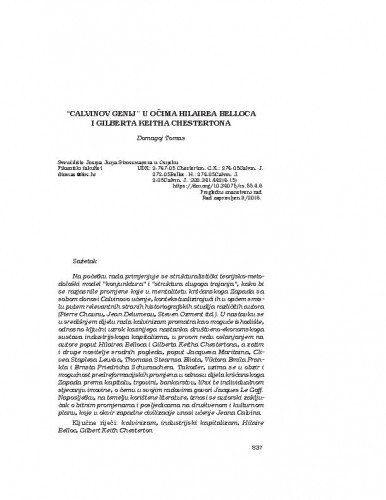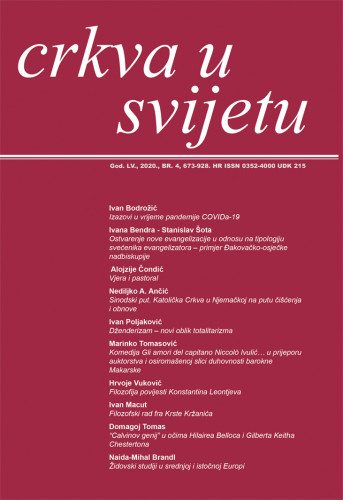Na početku rada primjenjuje se strukturalistički teorijsko-metodološki model “konjunktura” i “struktura dugoga trajanja”, kako bi se razjasnile promjene koje u mentalitetu kršćanskoga Zapada sa sobom donosi Calvinovo učenje, kontekstualizirajući ih u općem smislu putem relevantnih stranih historiografskih studija različitih autora (Pierre Chaunu, Jean Delumeau, Steven Ozment itd.). U nastavku se u središnjem dijelu rada kalvinizam promatra kao moguće ishodište, odnosno ključni uzrok kasnijega nastanka društveno-ekonomskoga sustava industrijskoga kapitalizma, u prvom redu oslanjanjem na autore poput Hilairea Belloca i Gilberta Keitha Chestertona, a zatim i druge nositelje srodnih pogleda, poput Jacquesa Maritaina, Clivea Staplesa Lewisa, Thomasa Stearnsa Eliota, Viktora Emila Frankla i Ernsta Friedricha Schumachera. Također, uzima se u obzir i mogućnost predreformacijskih promjena u odnosu dijela kršćanskoga Zapada prema kapitalu, trgovini, bankarstvu, lihvi te individualnom stjecanju imovine, o čemu u svojim radovima govori Jacques Le Goff. Naposljetku, na temelju korištene literature, iznosi se autorski zaključak o bitnim promjenama i posljedicama na društvenom i kulturnom planu, koje u okvir zapadne civilizacije unosi učenje Jeana Calvina.; At the beginning of the paper, a structuralist theoretical-methodological model of “conjuncture” and “long-term structure” is used to clarify the changes introduced by Calvin’s teaching to the mentality of the Christian West, contextualizing them in the general sense through relevant foreign historiographic studies of various authors (Pierre Chaunu, Jean Delumeau, Steven Ozment, etc.). The central part of the article depicts Calvinism as a possible starting point i.e., the crucial cause of the later emergence of the socio-economic system of industrial capitalism, primarily by relying on authors such as Hilaire Belloc and Gilbert Keith Chesterton, and other bearers of related views, such as Jacques Maritain, Clive Staples Lewis, Thomas Stearns Eliot, Viktor Emil Frankl and Ernst Friedrich Schumacher. Furthermore, the paper also considers the possibility of pre-reformation in the attitude of the Christian West towards capital, trade, banking, and the individual acquisition of property, as mentioned in the works of Jacques Le Goff. Finally, based on the used literature, the paper discusses the important changes and consequences on the social and cultural agenda, which were brought into the framework of Western civilization by Jean Calvin’s teaching.
Sažetak

 Crkva u svijetu : 55,4(2020) / glavni i odgovorni urednik, editor-in-chief Ivan Bodrožić.
Crkva u svijetu : 55,4(2020) / glavni i odgovorni urednik, editor-in-chief Ivan Bodrožić.